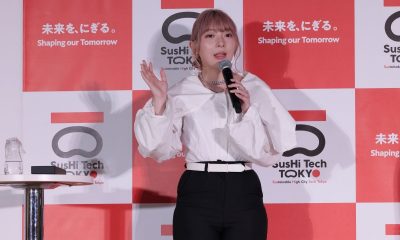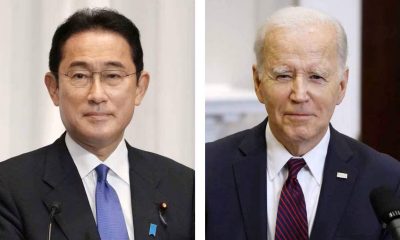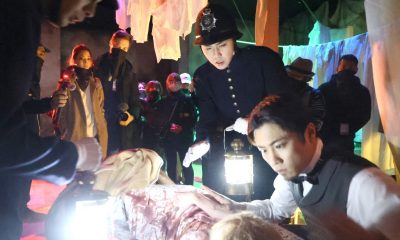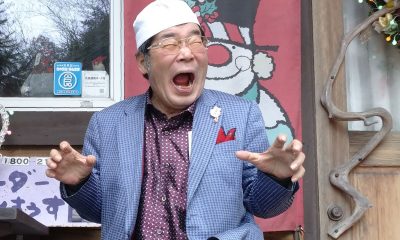Published
6 years agoon

JAPAN Forward recently had a one-on-one interview with Dr. Daniel Okimoto, professor emeritus at Stanford University. A second-generation Japanese American, Okimoto is pushing for Japan to make its mark in technological innovations in Silicon Valley.
We serialize his interview in five parts. He and his wife Michiko—they married at an old age—tell editor in chief Yasuo Naito how their partnership has extended into connecting Japanese and American businessmen through the Silicon Valley Japan Platform or SVJP, a non-profit organization.
ダニエル・オキモト-300x211.jpg)
During Okimoto’s years at Stanford University, he wrote and edited many books and articles on Japan’s political economy. He co-founded the Asia Pacific Research Center, where a steady stream of Japanese scholars, young government officials, and up-coming business executives came to spend time.
Among the Visiting Fellows was Hideaki Kumano, MITI official who had served as an aide to Prime Minister Yasuhiro Nakasone. As a reward for several years of exhausting service as Nakasone’s aide, Kumano was given permission to spend six weeks at Stanford, studying the dynamics of Silicon Valley.
(Fourth of five parts)
Part 1: Interview with Stanford’s Dr. Okimoto: Japan Has to Ride Waves of Tech Transformation
Part 2: Okimoto on Life in America: Realizing Dreams That Eluded Our Issei Parents
Part 3: From Internment Camp to Princeton to Stanford: Okimoto's American Journey
Hideaki Kumano was welcomed at Stanford. Everyone understood that he was a rising star at MITI (now called METI—the Ministry of Economy Trade and Industry). We knew that he stood a decent chance of rising to the top MITI post of “Administrative Vice-Minister.”
Yet, it was Hideaki Kumano’s wife, Michiko, who captured the hearts of the Stanford community. Owing to her upbeat and warm personality, Michiko made a flock of new friends.
Although she was a foreign visitor, she hosted many dinner parties at the one-bedroom apartment that the Kumanos had rented near the Stanford campus. Not only was Michiko a superb cook, she was also a charming hostess, who had a knack for making dinner guests, like me, feel relaxed and comfortable. The six weeks at Stanford in 1988 was the start of my close and long-standing friendship with the Kumanos.
Whenever I visited Japan, the three of us—Hideaki, Michiko, and I—would meet for dinner, lunch, or breakfast. On weekends, the Kumanos sometimes invited me to dinner parties held at their home.
In 2004, Hideaki Kumano passed away suddenly of a bacterial infection: “sepsis.” His death came as a huge shock. Throughout his career, Kumano had been the picture of good health. He seldom missed a day of work at MITI.
Michiko tells her story here:

Hideaki’s death was totally unexpected. It threw my life into great uncertainty. Three of my four adult children were married and had children to take care of. But my third daughter, Kaei, who was born deaf and had grown up psychologically impaired, required constant attention. Hideaki’s death caused me to wonder how I was going to take care of Kaei.
If I died suddenly, what would happen? Would Kaei even be able to notify her nearest of kin—her aunt, Hideaki’s only sibling, who lived next door?
Never mind an emergency: How was I going to survive from day to day?
In January 2005, during one of his business trips to Tokyo, Dan and I met for breakfast. I told him about the circumstances of Hideaki’s unexpected passing, explaining that he must have picked up the sepsis bacteria long before he had passed away. Dan expressed his condolences. That was the last time I saw Dan for half a year.
Later, I received an email from Dan, telling me about a fine program in the Bay Area for the hearing impaired. He thought that Kaei would benefit from the Deaf Studies Program. He suggested that I come with Kaei to California.
The Deaf Studies Program was intriguing. But I wanted to be totally open and honest with my sister-in-law, Hideaki’s sole sibling. When I told her about the opportunity, she supported the idea, saying, “It sounds like a good opportunity. Why don’t you go?”
My sister-in-law realized that I was caught in a bind. It was very thoughtful and kind of her to say, “From now on, shouldn’t you do what you and Kaei wish to do? Leave things up to Dan.”
My one daughter, who had never met Dan, may have had reservations, but the rest of my family was strongly supportive of my going to California.
Some of my Japanese acquaintances were surprised. A few were openly critical. Only a year had passed since Hideaki’s passing. But I knew, deep in my heart, that moving to California was the right thing to do. It didn’t matter what others thought.
Hideaki and Dan were good friends. They respected and liked each other. Hideaki had once said, “I want to be scholar.” He admired Dan’s life and career. I felt, therefore, that there was nothing wrong about my moving to California. I made the decision to go.
From California, I proposed to Michiko via email. She accepted. We were married at the ripe old age of 64.
ダニエル・オキモト-e1514703891780.jpg)
Although we came from very different backgrounds—Michiko from a wealthy, aristocratic family in Tokyo, and I from a poor, devoutly Christian family in California—we share much in common. We have the same values, priorities, goals, instincts, tastes, and sense of humor. It’s remarkable how compatible we are.
We have become the best of friends. Partners in life. We understand and respect each other. Michiko is loved and appreciated by my side of the family. I’m accepted warmly by hers. We have made many new friends together.

Michiko has an amazing talent for connecting Japanese and American businessmen. It has been an incredible asset for the Silicon Valley Japan Platform (SVJP), the non-profit organization to which both of us have dedicated ourselves.
(To be concluded)
(Click here to read the article in Japanese.)


SusHi Tech Tokyo 2024 Press Preview Reveals Exciting Sustainable Technological Innovations


Possible NATO Invitation for Kishida as Biden Seeks Regional Cooperation


Democracies Unite Against Tyranny at Major Conference in Seoul


Immersive Fort Tokyo: Odaiba's New Theme Park Opens


Groundbreakers | MiYO ORGANIC Founder on How Women Can Transform Japan's Green Industry


OBITUARY | Daiso Founder, the King of 100 Yen Shops with a Unique Business Philosophy

You must be logged in to post a comment Login